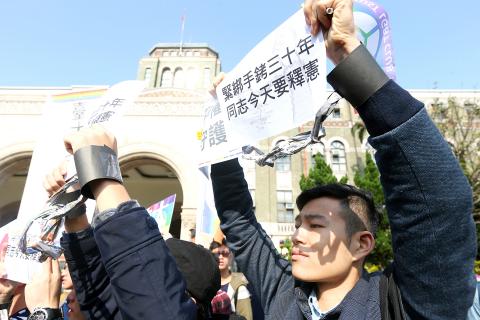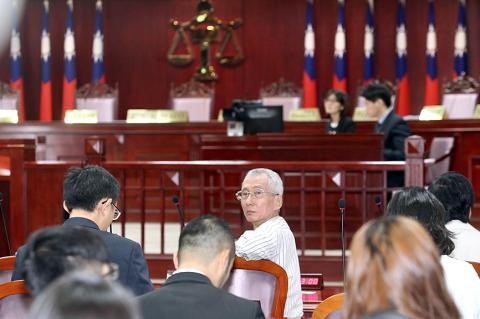The Council of Grand Justices yesterday began a session to hear a constitutional challenge concerning same-sex marriage, during which the spotlight fell mostly on Minister of Justice Chiu Tai-san (邱太三), who defended the legality of the Civil Code’s definition of marriage as being between a man and a woman.
In an unprecedented move, the debate was live-streamed. A ruling is expected within two months.
Taiwan is the first Asian nation to assent to a constitutional interpretation on the legalization of same-sex marriage.

Photo: CNA
The debate addressed two requests for an interpretation, filed by the Taipei City Government and gay rights advocate Chi Chia-wei (祁家威), who has over the past three decades sought legal recognition of his union with his partner.
The challenges mostly focus on marriage as defined in Chapter II of the Civil Code, which in Article 972, Section 1, stipulates that: “An agreement to marry shall be made by the male and the female parties in their own concord.”
Chi was the first to make his argument, followed by law professor Liao Yuan-hao (廖元豪), who represented the Taipei City Government, with both arguing that same-sex marriage is a right protected by the Constitution and that the Civil Code is unconstitutional because it does not protect homosexual unions.

Photo: CNA
The panel of 14 grand justices then heard opinions and reports from Chiu, followed by representatives of related government agencies, including the Ministry of the Interior’s Household Registration Department Director Wanda Chang (張琬宜).
After arguments were presented, a cross-examination session was held in which both sides were questioned by six court-appointed expert witnesses before the hearing ended at noon.
While a number of opinions were voiced during the hearing, Chiu’s remarks drew the most attention, particularly his insistence that a lawful marriage — based on its definition in the Civil Code and prior legal interpretations by the Ministry of Justice and the Council of Grand Justices — is limited to a union between a man and a woman.
“The Civil Code stipulates that marriage shall be between a man and a woman, and as such it is not unconstitutional. The Constitution guarantees citizens’ right to marry as that between a man and a woman, while marriage between people of the same sex is not covered under the Constitution,” Chiu said.
“For thousands of years in the nation’s history, society has instituted traditions and codes of conduct regarding marriage. Has there ever been a cultural institution or social phenomenon for same-sex marriage?” Chiu said.
“Without a doubt, there has been none,” Chiu said.
He then quoted one section of the Chinese classic I Ching (易經), also known as the Book of Changes, which reads: “With the existence of the earth and the sky, there came all living things. With the existence of the earth and the sky, there came men and women,” which he said illustrates that Chinese marriage traditions have — since ancient times — been based on a union between a man and a woman.
Chiu also suggested that same-sex marriage could destroy a number of traditional cultural and ritual observances, citing as an example the use of kao (考) and bi (妣) at funerals and memorial tablets for deceased fathers and mothers.

CHAOS: Iranians took to the streets playing celebratory music after reports of Khamenei’s death on Saturday, while mourners also gathered in Tehran yesterday Iranian Supreme Leader Ayatollah Ali Khamenei was killed in a major attack on Iran launched by Israel and the US, throwing the future of the Islamic republic into doubt and raising the risk of regional instability. Iranian state television and the state-run IRNA news agency announced the 86-year-old’s death early yesterday. US President Donald Trump said it gave Iranians their “greatest chance” to “take back” their country. The announcements came after a joint US and Israeli aerial bombardment that targeted Iranian military and governmental sites. Trump said the “heavy and pinpoint bombing” would continue through the week or as long

TRUST: The KMT said it respected the US’ timing and considerations, and hoped it would continue to honor its commitments to helping Taiwan bolster its defenses and deterrence US President Donald Trump is delaying a multibillion-dollar arms sale to Taiwan to ensure his visit to Beijing is successful, a New York Times report said. The weapons sales package has stalled in the US Department of State, the report said, citing US officials it did not identify. The White House has told agencies not to push forward ahead of Trump’s meeting with Chinese President Xi Jinping (習近平), it said. The two last month held a phone call to discuss trade and geopolitical flashpoints ahead of the summit. Xi raised the Taiwan issue and urged the US to handle arms sales to

BIG SPENDERS: Foreign investors bought the most Taiwan equities since 2005, signaling confidence that an AI boom would continue to benefit chipmakers Taiwan Semiconductor Manufacturing Co’s (TSMC, 台積電) market capitalization swelled to US$2 trillion for the first time following a 4.25 percent rally in its American depositary receipts (ADR) overnight, putting the world’s biggest contract chipmaker sixth on the list of the world’s biggest companies by market capitalization, just behind Amazon.com Inc. The site CompaniesMarketcap.com ranked TSMC ahead of Saudi Aramco and Meta Platforms Inc. The Taiwanese company’s ADRs on Tuesday surged to US$385.75 on the New York Stock Exchange, as strong demand for artificial intelligence (AI) applications led to chip supply constraints and boost revenue growth to record-breaking levels. Each TSMC ADR represents

State-run CPC Corp, Taiwan (CPC, 台灣中油) yesterday said that it had confirmed on Saturday night with its liquefied natural gas (LNG) and crude oil suppliers that shipments are proceeding as scheduled and that domestic supplies remain unaffected. The CPC yesterday announced the gasoline and diesel prices will rise by NT$0.2 and NT$0.4 per liter, respectively, starting Monday, citing Middle East tensions and blizzards in the eastern United States. CPC also iterated it has been reducing the proportion of crude oil imports from the Middle East and diversifying its supply sources in the past few years in response to geopolitical risks, expanding